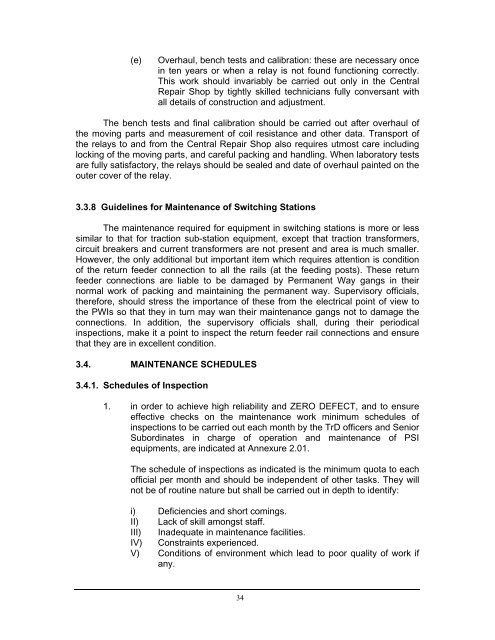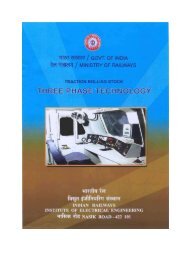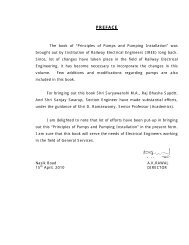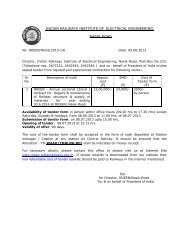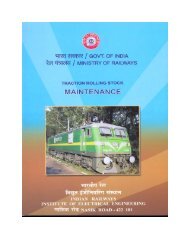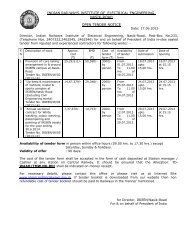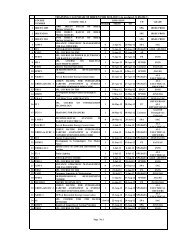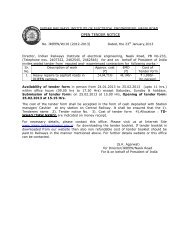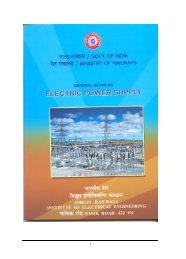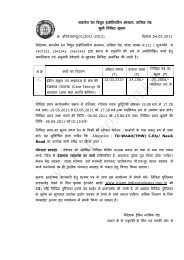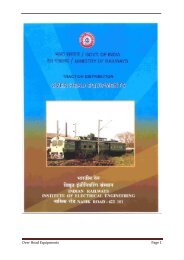remote control equipment - Indian Railways Institute of Electrical ...
remote control equipment - Indian Railways Institute of Electrical ...
remote control equipment - Indian Railways Institute of Electrical ...
Create successful ePaper yourself
Turn your PDF publications into a flip-book with our unique Google optimized e-Paper software.
(e) Overhaul, bench tests and calibration: these are necessary once<br />
in ten years or when a relay is not found functioning correctly.<br />
This work should invariably be carried out only in the Central<br />
Repair Shop by tightly skilled technicians fully conversant with<br />
all details <strong>of</strong> construction and adjustment.<br />
The bench tests and final calibration should be carried out after overhaul <strong>of</strong><br />
the moving parts and measurement <strong>of</strong> coil resistance and other data. Transport <strong>of</strong><br />
the relays to and from the Central Repair Shop also requires utmost care including<br />
locking <strong>of</strong> the moving parts, and careful packing and handling. When laboratory tests<br />
are fully satisfactory, the relays should be sealed and date <strong>of</strong> overhaul painted on the<br />
outer cover <strong>of</strong> the relay.<br />
3.3.8 Guidelines for Maintenance <strong>of</strong> Switching Stations<br />
The maintenance required for <strong>equipment</strong> in switching stations is more or less<br />
similar to that for traction sub-station <strong>equipment</strong>, except that traction transformers,<br />
circuit breakers and current transformers are not present and area is much smaller.<br />
However, the only additional but important item which requires attention is condition<br />
<strong>of</strong> the return feeder connection to all the rails (at the feeding posts). These return<br />
feeder connections are liable to be damaged by Permanent Way gangs in their<br />
normal work <strong>of</strong> packing and maintaining the permanent way. Supervisory <strong>of</strong>ficials,<br />
therefore, should stress the importance <strong>of</strong> these from the electrical point <strong>of</strong> view to<br />
the PWIs so that they in turn may wan their maintenance gangs not to damage the<br />
connections. In addition, the supervisory <strong>of</strong>ficials shall, during their periodical<br />
inspections, make it a point to inspect the return feeder rail connections and ensure<br />
that they are in excellent condition.<br />
3.4. MAINTENANCE SCHEDULES<br />
3.4.1. Schedules <strong>of</strong> Inspection<br />
1. in order to achieve high reliability and ZERO DEFECT, and to ensure<br />
effective checks on the maintenance work minimum schedules <strong>of</strong><br />
inspections to be carried out each month by the TrD <strong>of</strong>ficers and Senior<br />
Subordinates in charge <strong>of</strong> operation and maintenance <strong>of</strong> PSI<br />
<strong>equipment</strong>s, are indicated at Annexure 2.01.<br />
The schedule <strong>of</strong> inspections as indicated is the minimum quota to each<br />
<strong>of</strong>ficial per month and should be independent <strong>of</strong> other tasks. They will<br />
not be <strong>of</strong> routine nature but shall be carried out in depth to identify:<br />
i) Deficiencies and short comings.<br />
II) Lack <strong>of</strong> skill amongst staff.<br />
III) Inadequate in maintenance facilities.<br />
IV) Constraints experienced.<br />
V) Conditions <strong>of</strong> environment which lead to poor quality <strong>of</strong> work if<br />
any.<br />
34


